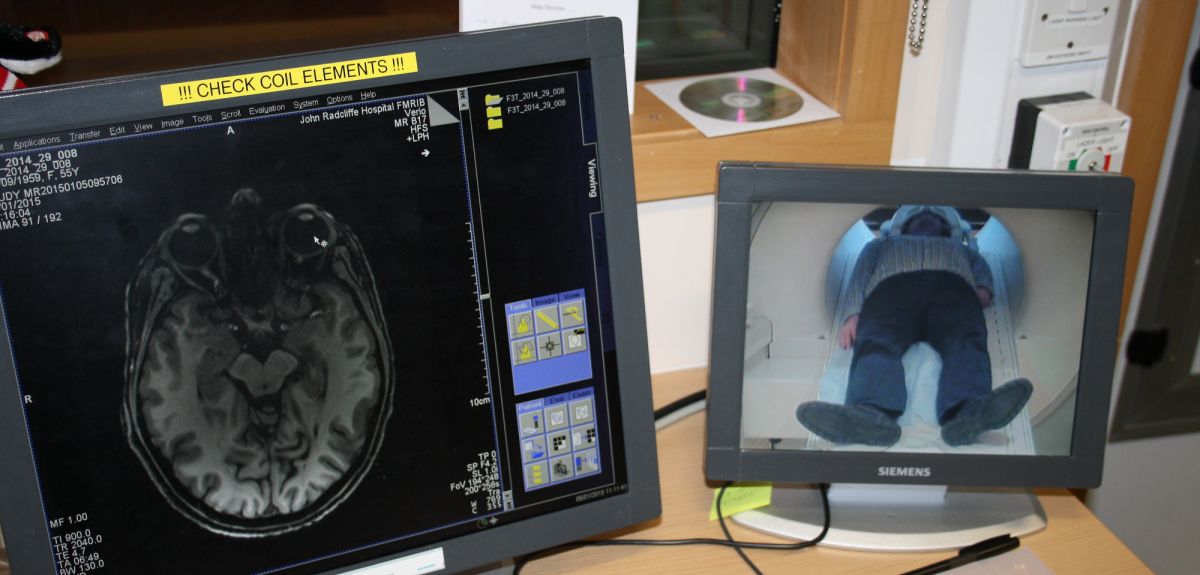
Credit: Oxford University Hospitals NHS Trust
'Unfussy' brain finds ways of coping with loss of a hand
People born without one hand, who are still able to use both limbs well in otherwise two-handed tasks, are likely to show brain activity which resembles that of people with two hands, an Oxford University study has found.
'The brain doesn't care if you are born with only one hand. The brain is not fussy about whether there is a hand at the end of the arm, a prosthetic or a "stump" – so long as it is used in a similar way,’ says lead author Dr Tamar Makin from the University of Oxford’s Centre for Functional Magnetic Resonance Imaging of the Brain (FMRIB).
The team's results might indicate ways in which new amputees may be able to regain near-normal function, through therapy which potentially takes advantage of the brain resources normally used by the missing hand.
A previous study from Dr Makin's group shows that people born without a hand tended to use the remaining part of the arm in their daily life. When moving that arm, they showed activation in a brain area corresponding to the missing hand.
In contrast, people who were born with a hand and lost it later in life tended to favour their intact hand much more. For them, moving the opposite, intact hand tended to activate the brain area corresponding to the missing hand.
These differing patterns of brain activation suggest that the body part which is used more to compensate for the absence of the hand takes over the brain area which would otherwise have been used to move the missing hand.
The new study, published in the journal eLife, shows that the extent different people compensate for a missing hand has an even greater effect on the brain. So much so that people with a missing hand who can do two-handed tasks nearly as well as able-bodied people (such as putting on socks or using a knife and fork) have brains that are nearly indistinguishable from those of able-bodied people.
The brain doesn't care if you are born with only one hand.
Dr Tamar Makin
The study involved 38 participants (14 born with one arm, 24 with two) who were asked to rest quietly in a MRI scanner while the researchers tracked their brain activity. The scientists looked at how brain activity on one side of the brain correlated with the corresponding activity on the other side of the brain. They found that there was a symmetrical pattern of activity in those with two hands. Those with a missing hand, as a group, were more likely to have an asymmetrical pattern of brain activity, because of differences in brain areas linked to the missing hand versus the intact hand.
However, the more people used the stump in everyday life, the more symmetrical the pattern of their brain activation. The few people with a missing hand who functioned nearly as well as two-handed people showed brain activity that was almost indistinguishable from those with two hands.
Study co-author Dr David Henderson Slater, Consultant at the Nuffield Orthopaedic Centre in Oxford, said: 'We have always known that some people adapt to the loss of a limb very soon, and start to make changes in the way they use other parts of their body to compensate for not having a hand. It is encouraging to see that there is hope for improvement even after devastating injuries, and to understand better what is going on inside the brain to make these behavioural adaptations. We may be able to incorporate this knowledge into the therapy we offer to new amputees.'
 New study estimates NHS England spends 3% of its primary and secondary care budget on the health impacts of temperature
New study estimates NHS England spends 3% of its primary and secondary care budget on the health impacts of temperature
 International collaboration launches largest-ever therapeutics trial for patients hospitalised with dengue
International collaboration launches largest-ever therapeutics trial for patients hospitalised with dengue
 Oxford-built multi-agent assistant for cancer care to be piloted in collaboration with Microsoft
Oxford-built multi-agent assistant for cancer care to be piloted in collaboration with Microsoft
 World's first Phase II Nipah virus vaccine trial launch
World's first Phase II Nipah virus vaccine trial launch